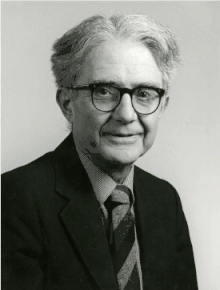Gustav Victor Rudolf Born
Gustav Victor Rudolf Born FRCP, HonFRCS, FRS (29 July 1921 – 16 April 2018)[1] was Professor of Pharmacology at King's College London and Research Professor at the William Harvey Research Institute, Barts and The London School of Medicine and Dentistry.
| Gustav Victor Rudolf Born | |
|---|---|
 | |
| Born | 29 July 1921 |
| Died | 16 April 2018 |
| Occupation | Scientist |
He was born in Germany, the son of the scientist Max Born and his wife Hedwig Ehrenberg. His family left Germany, as his father and maternal grandfather were Jewish. He was educated at the Oberrealschule, Göttingen. After relocating to the UK with his father, he attended The Perse School, Cambridge, Edinburgh Academy and the University of Edinburgh. His essay entitled "Six cases illustrating lithiasis of the urinary tract, from the Western General Hospital, Edinburgh" was awarded the Pattison Prize in Clinical Surgery (University of Edinburgh, 1943).[2]
Career
From 1973 to 1978 he was Sheild Professor of Pharmacology at Cambridge. He was elected a Fellow of the Royal Society of London[3] in 1972, and of the Royal College of Physicians in 1976. He was Professor of Pharmacology at King's College London, 1978–86, and became Research Professor at the William Harvey Institute in 1989.
Family
Born married Ann Plowden-Wardlaw, a medical doctor and Kleinian psychoanalyst, with whom he had 3 children.In 1962, he married Dr Faith Maurice-Williams, with whom he had two more children, one of which being Carey Born, an actress and filmmaker, known for her production company FirstBornFilms. His other daughter is Georgina Born, Professor of Sociology, Anthropology and Music at the University of Cambridge, and his niece is singer and actress Olivia Newton-John.
Publications
In 2006 he co-authored a book with Lorie Karnath "Wohin geht die Sonne, wenn ich schlafe" Nymphenburger Verlag, Munich.
Other
Born was a member of the advisory committee to the Anti-Concorde Project.
See also
- Gustav V. R. Born (2002). The Born Family in Göttingen and Beyond. Termessos Verlag. ISBN 978-3-938016-05-3. Retrieved 12 February 2008.
- Molecular Frontiers Journal Editorial, Gustav Born, Lorie Karnath https://www.worldscientific.com/doi/10.1142/S2529732518010010
External links
References
- "Max-Born-Berufskolleg - Technisches Berufskolleg in Recklinghausen". Max-Born-Berufskolleg.
- Born, G. V. R. (1943). "Six cases illustrating lithiasis of the urinary tract, from the Western General Hospital, Edinburgh". Cite journal requires
|journal=(help) - Flower, Rod (2020). "Gustav Victor Rudolph Born. 29 July 1921—16 April 2018". Biographical Memoirs of Fellows of the Royal Society.